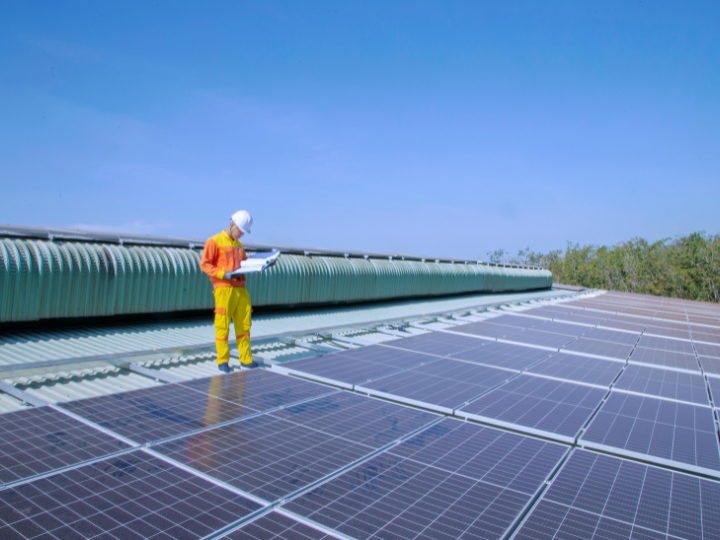by Johan Lindahl*
Europe must rebuild significant solar manufacturing capacity to secure its energy future.
In his competitiveness report Mario Draghi argues that the EU should protect strategic industries by retaining essential know-how and manufacturing capacity; boost European investments with local-content requirements; and maintain technological sovereignty. This approach is commendable and one the EU should fully embrace.
However, in presenting his report to the European Parliament on September 17, Draghi suggested that "for some technologies, like solar panels, foreign producers are so far ahead that attempting to capture production in Europe would only slow decarbonization”.
This article argues that European solar manufacturing is a strategically important industry for the EU, highlights misconceptions about its perceived lag, and emphasizes its importance for EU energy security.
Traditional economic theory favors comparative advantage. But COVID-19 and the Ukraine war revealed Europe’s vulnerability and the risk to Europe’s energy security posed by the global economy’s reliance on authoritarian regimes.
Some argue that solar energy differs from gas because fuel-based plants need continuous supply, while renewables provide independent power once installed. Or in other words, Moscow can cut Europe’s gas, but Beijing can’t block the sun. However, this view is an oversimplification and, in some ways, incorrect.
Accepting China’s control over solar panel pricing may seem an acceptable risk to some businesses and politicians in exchange for low-cost imports. However, this ’favourable’ situation may be short-lived, and its advocates might be underestimating the immediate risks associated with such dependence.
Beyond China’s ambition to bring Taiwan under its control as part of the ’One China’ policy, which could disrupt major trade routes, the low prices of Chinese solar panels might signal a looming economic bubble. China has been grappling with the fallout of a real estate bubble that has been building for years.
To mitigate this, China has put significant focus on fostering industry capacity in net-zero technologies, and export of the ‘New Three’ commodities. Solar panels, electric vehicles, and batteries skyrocketing from $20 billion in 2017 to over $150 billion in 2023, now making up 4.5% of its exports.
In the solar sector alone, China’s push for capacity has led to an global annual manufacturing capacity of about 1,103 GW by the end of 2023, while demand was only 456 GW.
This surplus has sharply lowered Chinese solar panel prices from $0.30/W in mid-2023 (sustainable for European producers) to $0.10/W or less.
Chinese companies have not suddenly become three times more cost-effective but are selling below production costs, as shown in their financial reports — mirroring similar practices in batteries and electric vehicles.
Even for China, the world’s second-largest economy, selling 4.5% of exports below manufacturing costs or at extremely low margins, propped up by government subsidies to counter a real estate crisis, is unsustainable and may lead to a price bubble in net-zero technologies.
If Europe surrenders its capacity to produce key components for the major future energy technology, how will it sustain its energy transition if that bubble bursts?
Also worth keeping in mind is that even if European-made solar panels currently are more expensive, they account for only 25–30% of total solar system costs. Including capital costs, operations, and maintenance, the price difference adds just 0.05–0.25 c€/kWh to solar power production costs.
Furthermore, thanks to solar inverters, Beijing could indeed potentially ’turn off the sun’ in Europe. The operation and software updates of the systems are controlled by the companies supplying the inverters. These include the possibility to suddenly and remotely shutdown the inverters, or change the operation frequency, which could seriously jeopardize the stability of the EU electricity grid.
Under China’s National Intelligence Law, companies must comply with government directives, meaning Chinese inverter firms could be compelled to initiate blackouts in Europe, which could lead to severe outages.
The risk is heightened by that Chinese inverter manufacturer’s greater-than-80% share of the solar market in Europe, which sidelines a capable European industry that could meet the full demand at adequate market conditions. This aggressive market takeover — mirroring China’s strategies in batteries, and EVs — risks Europe’s control over our energy infrastructure.
Europe must rebuild significant manufacturing capacity to secure its energy future. While not all solar panels or inverters need to be produced locally, a strong domestic presence complemented with regulations addressing the controllability of inverters is essential to ensure Europe’s independence from potentially hostile foreign actors.
*secretary general at the European Solar Manufacturing Council
**first published in: Euractiv.com




 By: N. Peter Kramer
By: N. Peter Kramer

